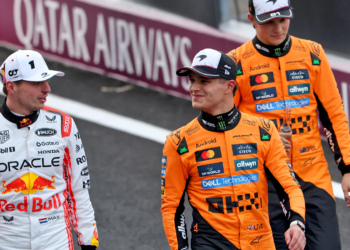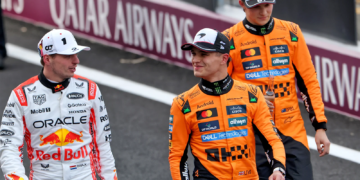Red Bull chief Christian Horner claims the reduced wind tunnel time imposed on the team for breaching the cost cap has served to increase motivation within the team.
The FIA found the Austrian outfit guilty of exceeding the $145 million cost cap in place for the 2021 season by £400k in October last year.
With Red Bull already set to inherit the least wind tunnel and CFD testing time of all the teams on the grid due to its status as Constructors’ champions, the team’s top brass accepted a breach agreement that reduced its aerodynamic testing time by a further 10%.
It means that Red Bull currently only receives 63% wind tunnel time this year, compared to the 100% enjoyed by Aston Martin, who sit second to the Milton-Keynes side in the standings.
While Horner accepts the restrictions have forced Red Bull to allocate its resources more productively, the team boss has said it has heightened the desire of the team to remain at the top of Formula 1.
“I think it focuses everybody’s minds, and it drives efficiency,” he told Autosport about the impact the penalty has had on team personnel. “What we lost in wind tunnel time we gained in motivation.”
After sweeping to 17 wins out of 22 races in 2022 to secure both championships, Red Bull looks well-placed to repeat its domination in 2023 after the opening round.
The reigning champions followed up its pre-season billing of clear title favourites by registering a comfortably executed 1-2 race result in Bahrain.
As a measure of its dominance over the opposition, race winner Max Verstappen ended up 36s clear of the closest non-Red Bull car: Fernando Alonso’s Aston Martin.
Although the reduction in wind tunnel testing time has appeared to not destabilise the Red Bull camp on the track yet, Horner believes it could prove to have long-term implications.
“It is something you have to view over 12 months, because it is not just this year’s car, it is also next year’s car,” he clarified.
“I think the really positive thing for us is that we are not dealing with a fundamental issue that soaks up that resource and time.
“It was vital for us to be able to cope with that penalty and to have a solid starting point. That is what the team has done a great job in achieving.”
“We have another eight, nine months still to go with it. It means that we’re going to have to be very selective and extremely efficient in how we develop this car and, of course, next year’s car.”
Last season a technical directive was issued ahead of the second half of the season that tipped the balance of power more towards Red Bull.
However, Horner has warned that any potential change to the 2024 regulations could now prove to be a tricky situation for Red Bull to negotiate.
“It really depends if anything changes in the regulations,” Horner outlined.
“We’re expecting stable regulations but, of course it is a disadvantage, a handicap, to have not only the incremental difference that you have by being in first place in the championship, and on top of that a further 10%.
“So we’re 15% less time than [Ferrari] and 20% less than Mercedes and so on. That’s a significant number. So for us it’s all about being efficient and being effective in what we apply and choose to test in the tunnel, and how we develop both the RB19 and the RB20 car.”









